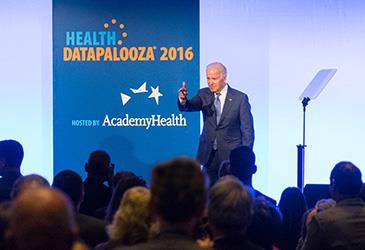U.S. Vice President Joe Biden passionately called for data experts, researchers and physicians to join him in the National Cancer Moonshot Initiative announced earlier this year by lending their talents and expertise to the global fight against cancer. Breaking down the walls that prevent data sharing will be an essential component to the initiative,
s is physician input. 
Mr. Biden last week addressed the health IT community at Health Datapalooza in Washington, D.C.
“Data and technology—when combined—can have an incredible impact on saving people’s lives and improving the health of people here and around the world,” the vice president said. “Six years ago our administration decided we should open up more of the data that’s held by the federal government to drive progress in medical research and health care delivery.”
Since that time the U.S. Department of Health and Human Services has published more than 2,100 data sets.
“Imagine what you could do to help in the fight against cancer if you had access to the millions of cancer pathologies and genomic sequences, family histories, and treatment outcomes,” he said. “You know what this significant access to data has enabled you to find out thus far, and I think we’re only scratching the surface.”
4 key ways data will play a role
“Cancer-related deaths are down 23 percent over the last 21 years,” Mr. Biden said. “But we haven’t done nearly enough. We have to ask ourselves, ‘Why are we not progressing more rapidly?’”
It’s expected, he said, that the world will see almost 20 million new cancer cases and 11.4 million more deaths from cancer by the year 2025 without dramatic intervention. “How can we prevent that from happening?” he asked. Mr. Biden cited four things that need to happen next:
- Generate large quantities of health data
- Make that data available to share by breaking down silos
- Build a network centered around patients that allows access to privacy-protected data
- Support quality data analysis to turn raw data into knowledge
“Researchers need to share data in order to move discoveries more rapidly,” he said. “Published research is hidden behind paywalls that lead to unnecessary duplication and failed efforts and wasted time and money.”
A personal experience with cancer
Mr. Biden’s son passed away three years ago from glioblastoma. “When you have someone near and dear to you—and every one of you has experienced this in some form or another,” he said solemnly, “when they’re in trouble you try to learn as much as you can as rapidly as you can, with as much depth as you can to see if you can help.”
“It wasn’t until then—now three years ago,” Mr. Biden said, “that I came to realize that if this had been five years earlier, or five years later, the circumstances would have been either more difficult … or maybe I’d be standing here with my boy.”
“My son had an exotic and last-ditch treatment for the glioblastoma,” he said. “They injected a virus into the tumor in his brain, but it required MRIs on a regular basis.”
But the location where his son’s MRIs were taken could not share the data with the location where he was receiving his treatment. Mr. Biden had to go to great lengths to put the data on a disc and make sure it was available to the other location on a regular basis.
“Most major cancer centers don’t have an easy way … to share data, including patients’ records, test results, family histories and treatment responses,” he said. “We’ve got to change this. We need to break down silos that keep research away from the world and from one another.”
“This matters,” Mr. Biden said. “It’s a matter of life and death.”
Leading a global effort
“You all stepped up,” Mr. Biden said. “You developed apps to track your blood pressure and how you sleep. We need this same use of your talents and expertise in the fight against cancer.”
“More and more people are working together,” he said.
During a recent trip to the Middle East to discuss ISIS, the leader of the United Arab Emirates first wanted to discuss how they could take part in the moonshot. And at the recent nuclear security summit, where more than 50 of the world’s leaders assembled, President Obama first had to address the leaders’ interest in talking with the vice president about cancer research.
“A few years ago it took more than a decade and $2.7 billion to sequence a fresh human genome. Now it takes less than a day, and it costs roughly $1,000,” he said. “Big data and computing power together provide the possibility of significant insight into how genomics, family medical history, lifestyles, genetic changes can trigger cancer—and how the cancer should be treated.”
“We are on the cusp of significant breakthroughs that will save lives, sooner, to the benefit of all humanity.”
Physicians, researchers and developers can go to the National Cancer Moonshot Initiative website and tell Mr. Biden about their plans to find collaborative solutions to accelerate progress and overcome barriers.
“Help in the fight against cancer,” he said. “Please use your talents and tell us how—tell me how—we can do more. Tell me where you disagree. What are the things we should be focusing on?”




